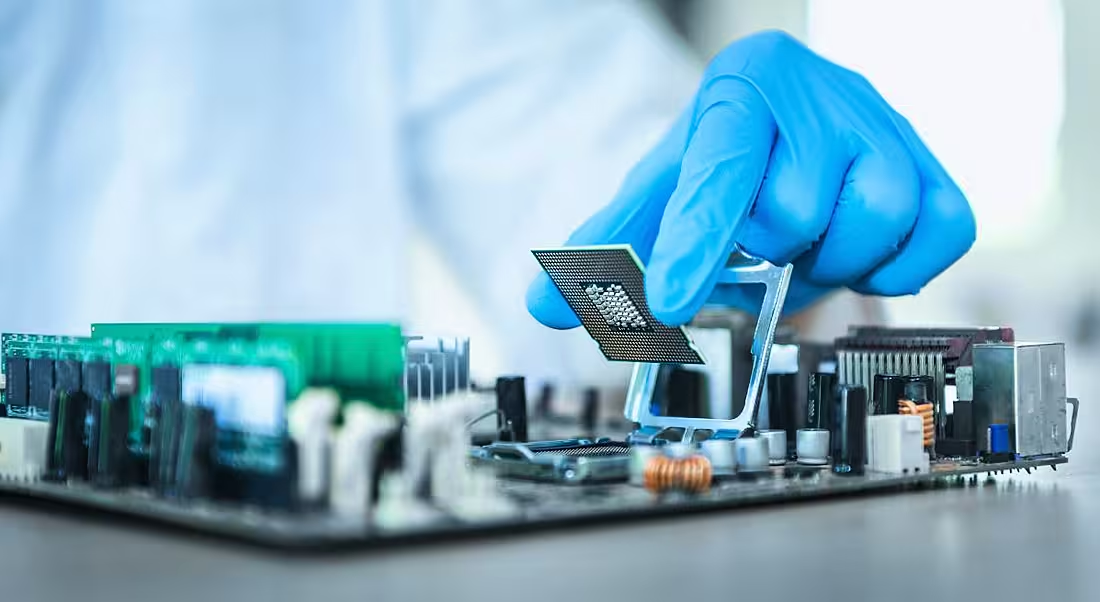While Ireland has previously punched above its weight in the semiconductor space, a lack of talent could be its undoing.
There has been growing concern regarding the world’s semiconductor industry in recent years amid an ongoing shortage and an increasing demand.
With chips going into a vast amount of electronics, the production of smartphones, laptops, game consoles and other devices has been severely affected. The auto industry has also felt the crunch of the shortage.
The shortage has opened a conversation about the world’s reliance on foundries in the US and Asia for this essential tech component.
In response, the EU has also been working a €43bn strategy to become a leader in the semiconductor sector.
The Act was provisionally agreed by the European Council and Parliament last month and aims to double the EU’s global market share in semiconductors to 20pc by 2030 while protecting Europe’s supply chain.
Meanwhile, the UK revealed its strategy to build up and protect its semiconductor sector earlier this week, with plans to invest £1bn over the next decade.
But while policymakers and industry players alike are making concerted efforts to boost chip manufacturing, this will reveal another problem that is already chronic across the tech industry – a skills shortage.
‘It’s a bit like the stock market’
Working in the semiconductor industry was once an extremely popular career option, but with so many other growing areas of emerging tech to work in, has this popularity decreased?
Peter Kennedy, professor of microelectronic engineering at University College Dublin, said the semiconductor industry has always been cyclical in nature.
“When there’s a recession, demand for products falls and employment contracts slightly. When the recession ends, or a new technology emerges, demand for microchips and the engineers that design them, skyrockets,” he said.
“It’s a bit like the stock market. The underlying trend has been consistent exponential growth because semiconductors are being used in more and more applications all the time. That’s not going to end any time soon.”
For such a small country, Ireland has traditionally punched above its weight in the chips sector, building up a competitive advantage for almost 50 years.
‘To continue our leadership in semiconductors, we need a steady supply of electronic engineering graduates’
Analog Devices opened a chip fabrication plant, also known as a fab, in Limerick in 1976. This was followed by the opening of Intel’s European manufacturing and technology headquarters in 1989, which helped make Ireland a key hub for the semiconductor industry.
“When you have the people who know how to build and run a fabrication facility, it’s easier to win another one. That’s why Analog Devices and Intel have been able to grow their manufacturing activities continuously over four decades,” said Kennedy.
“When you have people who can design chips and university researchers that can feed new ideas, the industry will flourish. That’s why we have world-class chip design centres in Cork, Dublin and Limerick.”
Lack of skills could be Ireland’s downfall
While Ireland’s history in the chips industry is impressive, the skills shortage could pose serious challenges.
“The world doesn’t wait around for new technologies. If we don’t do it in Ireland, it will be done somewhere else. If you’re ahead in this field, you need to stay ahead,” said Kennedy.
“To continue our leadership in semiconductors, we need a steady supply of electronic engineering graduates at master’s level and doctoral level who are the best in the world at what they do, in design, manufacture and applications.”
The tech industry is suffering from skills shortages across the board, but the nature of working with semiconductors means it needs a huge range of skills.
Making a chip involves physics, chemistry, mechanical engineering, electronics, computer science and statistics.
Kennedy said when it comes to the design side of things, companies such as AMD, Analog Devices, Intel, Qualcomm and more are mainly in need of electronic engineers who are proficient in maths and computing.
“On the design side, AMD, Analog Devices, Bosch, Intel, Infineon, Qualcomm, and others mainly need electronic engineers who are creative, good with computers, and proficient in maths.”
Outside of designing chips, there are also the applications of them. Many may take for granted that everyone has a smartphone, that TVs are big and flat, that cars can alert you when you have a puncture or that your glucose levels can be continuously monitored. But all of these things require semiconductors.
“Here, we need people who know the application domains – energy, entertainment, health, etc, – and love to use technology to make the world a better place. Biology, physics, chemistry, mathematics, business and soft skills are all useful.”
Rebuilding Ireland’s skills pipeline
In order to avoid falling behind in the semiconductor industry, Ireland needs to think about how to ensure the pipeline of engineers remains strong, especially electronic engineers.
“The semiconductor industry, via MIDAS Ireland, does a good job of promoting electronic engineering as a career, but it starts too late. The country needs many more electronic engineers and we need to start developing talent earlier in the schools system,” said Kennedy.
“Start by offering applied maths in as many secondary schools as possible. In addition, make it as easy as possible for highly skilled engineering graduates to immigrate into Ireland to support the industry here.”
He added that universities are key to delivering highly qualified engineering graduates, while the National Microelectronics Research Centre and its successor, Tyndall National Institute, have played fundamental roles in developing talent to support the semiconductor industry.
“It is important that the State continues to invest in keeping Tyndall at the cutting edge so that the semiconductor research carried out in Ireland is the best in the world.”
Reflecting on his own role, Kennedy said that educators also should better explain the opportunities the field offers and the true impact semiconductor professionals can have on the world.
“As engineers, we are sensitised to it and see the transformational power of semiconductors everywhere we look. Others maybe take technological advances for granted, without realising the role that Irish-educated and Ireland-based engineers have played and continue to play in their development.”
10 things you need to know direct to your inbox every weekday. Sign up for the Daily Brief, Silicon Republic’s digest of essential sci-tech news.




